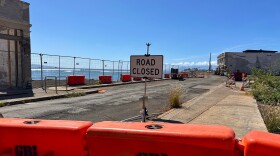Maui Mayor Michael Victorino says the county plans to work with state regulators to deal with groundwater discharges in the wake of a major U.S. Supreme Court ruling yesterday.
On a 6-3 vote, the justices ruled that Maui County is not exempt from the Clean Water Act and that it will likely need a permit if it continues to pump wastewater into the ground.
Environmentalists say the decision is a big win for protecting ocean waters, while county officials say the decision left a lot of uncertainty over next steps.
The case revolves around a Maui wastewater treatment plant in Lahaina that for decades has been pumping millions of gallons of treated sewage into the groundwater. Studies have shown the wastewater soon reached the ocean and damaged a coral reef.
Maui County has argued that permitting requirements under the Clean Water Act only apply to pollutants released directly into the ocean.
But in a 6-3 decision, the Supreme Court held that Maui County cannot avoid federal environmental regulations simply because it releases pollutants into the ground before these reach the ocean.
"It should be very clear to Maui County that they're violating the Clean Water Act and they should stop fighting and start fixing the problem," said David Henkin, an attorney with the environmental group Earthjustice, one of the plaintiffs in the case.
The high court did not decide whether the county requires a permit. That question is being left to the lower court to decide. The justices did, however, establish a test to help the court decide, saying that pollution flowing indirectly from a particular source requires a permit if it is “the functional equivalent of a direct discharge.”
And this confuses Maui County Council Chairwoman Alice Lee.
"We?ve always wanted to be in compliance...If we need to obtain a permit, can you tell us what permit? And how do you apply for it? Because there is no specific permit for what they are asking for. They have to come up with a permit.
The Supreme Court decision returns the Maui County case to a lower court for more definition.
Victornio said in a statement that the ruling helps provide the clarity the county was seeking.
“The Supreme Court agreed with the County of Maui that the 9th Circuit ruling was too broad and could possibly affect millions of homeowners with septic systems," he said in a statement.
"The Supreme Court also confirmed that discharges to groundwater are the responsibility of the states, which allows us to address this problem at a local level."
He said the county would be working with local regulators "to protect our waters.”




